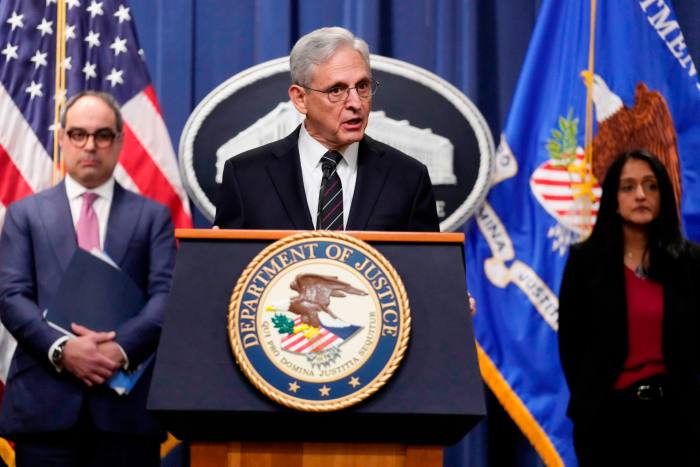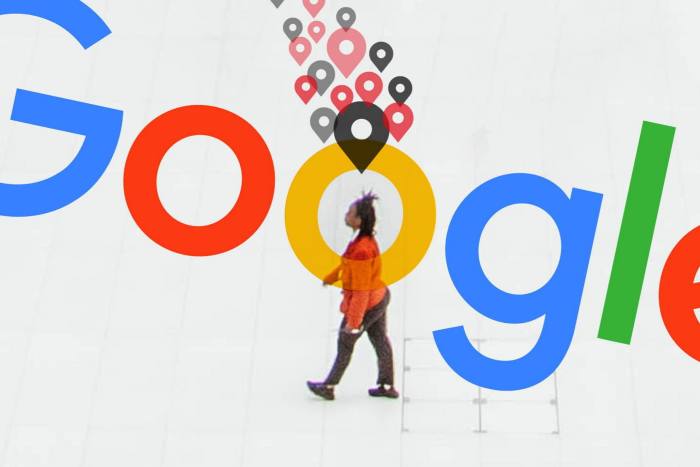
In February 2019, Dina Srinivasan, then an independent scholar, published an academic paper entitled ‘The Antitrust Case Against Facebook’, in which she identified a correlation between privacy and economics — and argued that the social media giant lowered its privacy standards as soon as it had defeated its rivals.
Just months later, the US Federal Trade Commission and a coalition of state attorneys-general began preparing an antitrust investigation into the tech group, filing actions against it in the following year.
Then, in December 2020, Srinivasan, now a fellow at Yale, published another paper suggesting that Google dominates advertising markets by engaging in conduct that lawmakers prohibit in financial markets.
Just over a year later, the US Department of Justice and several states sued the tech company, alleging that its dominance in digital advertising harms competition.
Both cases continue, and the companies contest the claims, but Srinivasan believes their power has been allowed to become too great. Here, she tells FT San Francisco correspondent Patrick McGee how she did her research and why even more scrutiny is needed.
Patrick McGee: You were thrust into the case against big tech when you wrote a paper [with] a very definitive title: ‘The Antitrust Case Against Facebook’. What happened? The media picked it up?
Dina Srinivasan: Yes . . . and then things started to fall from there . . . a subcommittee in Congress wrote . . . I think it was an open letter to the FTC, asking the FTC to open an antitrust investigation [into] Facebook.
Tech Exchange

The FT’s top reporters and commentators hold monthly conversations with the world’s most thought-provoking technology leaders, innovators and academics, to discuss the future of the digital world and the role of Big Tech companies in shaping it. The dialogues are in-depth and detailed, focusing on the way technology groups, consumers and authorities will interact to solve global problems and provide new services. Read them all here
PM: Most academic papers don’t go anywhere. Yours have had almost immediate consequences. But you didn’t think the government was going to take action against big tech?
DS: Right, I didn’t think the federal government would attack Facebook for harming users’ privacy. I didn’t think that they would latch on to that theory of harm and that theory of antitrust.
PM: What’s the core argument that you made, and why was it novel?
DS: I remember a lot of people saying that there weren’t antitrust issues with respect to the big tech companies because the price was zero, the products are free, and so there are no antitrust issues to see here.
And I didn’t think that was the case. I thought that you could basically use quality instead of price to construct an antitrust argument. So I thought there were things to be said that weren’t being said with respect to big tech and free markets and antitrust.
PM: Antitrust, for the last 150 years, was almost exclusively based on price: the idea that you would collude with your competitors and raise prices, consumers would be harmed and business would do really well. So, clearly, that paradigm is totally out of whack with services that are offered for free using an ad-supportive model, based on siphoning off your data.
DS: I never even thought that the last 150 years didn’t open the door for these types of arguments. I just literally thought nobody was making the arguments. Let’s not forget the case against Microsoft in the browser market. That was a ‘free’ market.
PM: I think you start your research on Facebook in 2017.
DS: Correct.
PM: By that point, Facebook has IPO-ed . . . it’s been free from its founding in 2004 or whatever it was. And you trace out the evolution of [Facebook] using privacy as a meaningful differentiator between itself and others, and how their values change as competitors fall by the wayside.
DS: First of all, as background, everyone in the industry that is selling advertising is trying to get more and more data and conduct deeper and deeper surveillance of consumers. Traditionally, this is done with cookies, and cookies are imperfect because users have agency over cookies, they can delete the cookies, and reset them. So I get to wipe the slate clean by resetting my cookies and regaining privacy from you. And I remember distinctly there was a moment in 2014 when Facebook announced that they were going to be merging cookie information with stable identities that they have on users.
PM: That means you could no longer wipe the slate clean?
DS: Yes. Basically, effectively, what it meant was that Facebook was tracking users . . . The other thing going on here was that Facebook was going to match cookie data with user identity data . . . So it can match identity data with this cookie data to conduct a type of tracking that, from a consumer perspective, would have been viewed as very invasive in a new way.
I thought it was incredible because I didn’t think it was anything that consumers would actually want or support. Yet there was one firm that could get away with it and do it. And having been trained in antitrust, I knew that, when you have a market and everyone is competing and only one firm is an outlier, that usually has something to do with market power.
Being able to do that would allow Facebook to make a lot more money on the advertising side. So I had this hypothesis that there was a market power privacy story.
PM: Playing devil’s advocate: if a brand wants to target me, they know my age, relative income level, city, a few of my preferences. But it’s not an individual who knows that, it’s an algorithm. So if an algorithm just does that matching, why is that invasive?
DS: For me, as a citizen, it seemed really obnoxious that I could go to the New York Times in the morning and have some entity make a permanent record of my reading habits. It seemed terribly invasive. It’s not an anonymous algorithm, it’s a firm. It’s a company. And that data exists in a database with my name, basically my SSN thumbprint on it. And who knows how far back those records go? Who knows what they’re being used for?
Just the idea, knowing that a firm would have that kind of information I thought was very invasive.
PM: One of my favourite examples is when Google was subpoenaed after the January 6th insurrection because everyone walking around the Capitol has cell phones and they could then get that data and track them all the way back to their addresses in Kansas or wherever. They could get their flights, where they went and everything. So location data alone is hugely powerful.
DS: Totally. As long as a private firm has access to the data, then a government can subpoena.
PM: How did this lead to you looking at Google? Was it that you’d just had one hit looking at a big tech company, so you might as well look at the other duopoly partner? Or did you already have reason to believe in the collusion narrative?
DS: What happened is I became fascinated with the field of economics in 2017. But I thought it would be quite ridiculous for me to pivot from advertising to just writing on random economic topics. So I thought the rational thing to do would be to first write about something to do with the industry I was coming from: advertising on Facebook and Google. And I knew that Google would be a bigger topic to take on so I left that one for a second.
PM: So it wasn’t anything you uncovered in your Facebook research that led you to Google?
DS: No. I had another moment that I sort of catalogued away. I think it was also in 2014, when Michael Lewis came out with his book, Flash Boys [about the competitive advantage sought by high-frequency financial traders]. Ad executives were passing around that book and laughing that similar shenanigans happen in ad markets but nobody knew. I thought the parallels were fascinating, and revisited that when I decided to go down the Google route.
PM: And the Google case really is a lot like Wall Street.
DS: Whether it’s from the state attorneys-general or if it’s the Department of Justice’s case against Google . . . both of those cases against Google are looking at ad markets and thinking about them in a way that’s parallel to brokers and stock exchanges. There are many parallels there.
PM: How do you compare the sophistication between buying and selling of online ads, that takes place in milliseconds, versus something like buying and selling stocks or bonds?
DS: In both markets, you have items being traded in milliseconds, at very high speeds, on centralised exchanges, and there are many exchanges in both markets. In the US, I think you might have 70-plus stock exchanges, and in ad markets you have dozens of ad exchanges as well.
And in order to buy and sell on these exchanges, you have to go through another algorithm intermediary on either side, on the buyside or the sellside. So you can’t just connect to the exchange directly, like you can with, for example, crypto. The structures of the markets are similar in that regard. What was your question?
PM: What’s your main case against Google? Is it that they have a dominant hand in both sides of the transaction as well as the oversight of it?
DS: The number one thing that we do in stock markets, to make sure they’re working competitively, is to manage conflicts of interest. You want to manage conflicts of interest between four nodes: the buyside; the sellside; the exchange in the middle; and then any entity that is buying and selling for its own account. And you have a similar situation in ad markets in terms of buyside, sellside, exchanges, and large sellers in the market, like a Google or a Facebook that are selling their own ads.
The second thing you do in stock markets is make sure that there’s a lot of transparency, so that customers can hold intermediaries to account and you can see how much you’re paying. But those two things are very lacking in ad markets.
PM: What did you find when you looked into Google?
DS: Literally, what I did was I had an entire wall of Post-it notes. [I’d say] Google’s doing this and I’d have it on a Post-it note. [Then] I started to study financial markets and I had Post-it notes of a different colour. Slowly but surely, one Post-it note of one colour I would put on top of the other Post-it note, and say that’s the same.
For example, I was looking at something that Google did. where it started to round up or round down the time stamps of trades to the nearest hour. I had no idea what it meant so I spent a lot of time researching financial markets. Then I found a case where a large broker in Chicago was prosecuted for insider trading, and the way that they were concealing insider trading was by changing the time stamps of trades, so that their customers could not find out what was going on. That’s how [my] research process worked.
PM: What does it do, to round up [time stamps]?
DS: Customers — meaning [web] publishers — would try to audit their auctions to make sure that their ad space is being sold to the highest bidder. One of the ways they would audit the options is by looking at the time stamps of trades. So, taking away the time stamps would interfere with that type of auditing process.
PM: Where is Google’s power in those four nodes in the ad exchanges?
DS: Google’s largest power is on the sellside. In the industry it’s called a publisher ad server — that is the piece of software the websites and apps use to manage all of their ad space, and then route it out to ad exchanges to try to get the highest price. Google’s power there, according to those lawsuits, is over 90 per cent They have a very strong stranglehold on the sellside of the market.
They also operate the largest exchange in the middle. They have the largest buyside, and they are, of course, one of the largest sellers of inventory in the market, vis-à-vis Google Search and YouTube.
PM: One of the best lines . . . was it would be like Citi Bank owning the New York Stock Exchange. Do you remember this line?
DS: . . . as if Goldman Sachs owns the New York Stock Exchange.
PM: And that’s the point: if you take really sophisticated people in finance, and tell them what’s going on in ads, they fall out of their chairs.
DS: Yes, they think it’s astounding. They think it’s astounding.
PM: In a highly-regulated environment like finance, this never would be allowed.
DS: Yes . . . I got to see [an] actual physical [stock] exchange. It’s basically a bunch of servers, and they control the speed through which trades arrive at the exchange through coils. So trades are coming in, and they’re all slowed down so that they reach the exchange at the same time.
It’s really interesting because Google operates an exchange and operates a buyside, and they market the fact that they have a speed advantage when trading on their own exchange! But, in financial markets, you have innovation that’s controlling speed
People literally fell out of their chairs. They find it fascinating to discover there’s another market in the US that’s like this that we didn’t even know about and this is allowed.
PM: And it’s massive . . . a $400bn marketplace.
DS: Yes.
PM: Your papers led to antitrust action on the part of state attorneys-general. And, with Biden, we have a whole new antitrust environment in the US. But do you think there’s going to be a real-world impact in terms of how the digital ad space operates?
DS: I think that we will see change, especially as a result of the litigation and the investigations the various government bodies are doing into their conduct.
PM: Are you a champion of Apple’s privacy policy? Because Apple has instituted a privacy policy that very much kneecaps Facebook’s ability to do the things that you wrote about: targeting users, creating behavioural profiles of them, having a pixel so you could see them just browsing the web. Does that make Apple your ally, your hero, or something like that?
DS: No, I wouldn’t say hero . . . because any of these companies are too heavily incentivised to gather as much data as they can to build their own products.
PM: So you’re worried about Apple’s motivations?
DS: Apple definitely has the same motivations as the others.
PM: But, to be fair, they don’t deploy them like the others do.
DS: Not yet.
PM: The Facebook narrative [is that] as competition fell away, they changed their motivations or their practices. Is that what you’d worry about with Apple?
DS: Yes, I do think that that’s something that we should worry about with respect to data and privacy with respect to any corporation, because they can always change the terms. They’re sitting on the asset, and they can change the terms of use, moving forward, any time they want. And that’ll change according to their market power and economic incentives.
PM: Facebook and Google are at least 85 per cent advertising revenue based . . . but, recently, Snap and Facebook have started monthly subscription programmes. So, it’s no longer the case, if this succeeds, that it’s a free product . . . If they’re able to build up a model more like Spotify, I’m wondering if you consider that a bit of a win?
DS: In my experience, it’s very difficult for very large corporations to change their compass. If you have companies where their entire operational structure and incentive has been to collect data and to use data in these auction markets . . . it’s probably impossible to get the corporation to shift. You might have a little outlier behaviour. But I don’t think you would see meaningful change.
PM: What about the future of antitrust? Are the laws today sufficient to actually do the things that you believe need to be done, or do we need a rewrite, a 21st-century rewrite?
DS: Usually, when people ask that question, they’re actually asking a more pointed question, and they’re asking whether one agrees with the consumer welfare standard or not . . . And that just means, do you agree that the foundational question in antitrust cases should be the consumer’s welfare?
Today, consumers’ welfare means price or quality. And so that question usually means: do you think it should be something different than that? There are lots of things that we could do to make the system more efficient. Five, six, seven years for an antitrust case to conclude in a high-tech market is ridiculous, and ridiculously slow. But the legal standard of focusing on the consumer’s welfare I like, and I don’t think that should change. I think it’s very democratic.
The question is literally, what does the consumer want? So if the consumer values more privacy, then that comes in to construct the antitrust argument. If the consumer values lower price, then that comes in.
PM: What about privacy on the web, privacy mechanisms to keep your data private and so forth. Are you bullish about that? Is that a meaningful thing that you want to see a lot more of?
DS: I would love to see a lot more of it. I’m not optimistic about it happening. I think, generally, our society is headed more and more towards increased data collection and the increased relevance of data.
PM: This brings me back to Apple. Apple’s ambition for advertising is that this auction [for advertising] basically is happening on the device — so nothing is having to go to the cloud. The iPhone essentially knows what my preferences are, knows who I am, knows what I like, so that the ads that are served to me are served through some encrypted privacy handling way. If they succeed, isn’t that a big win for the consumer and for you personally?
DS: Yes, from a privacy perspective.
PM: But do you still worry about what it means for the largest company in the world to have that power?
DS: Yes. From a big-picture standpoint, you have a situation where it used to be the government doing surveillance based on warrants, and that was the primary mechanism of conducting individualised intelligence.
PM: A really high threshold to get access to data.
DS: Yes, — and not just the high threshold but also the mechanism of collecting the data. And, over the last ten, or 20 years, the technical capabilities of private firms to collect data on consumers and citizens has gone through the roof. And it continues to go through the roof.
From a product perspective and a business perspective, all these companies are clamouring to get their hands on more and more data to do individualised price discrimination, or as intelligence when building products. Corporate America is only going to be heading in that direction more and more. And I think that’s a very significant shift, which scares me, because I’m not sure what the unintended consequences are.
I’ll give an example. The other day, I was chatting with somebody about whether I could use public data sets to determine whether two people had been meeting in the same place at the same time. And somebody in the ad market literally walked me through how to do that. So I could take any two humans I was curious about and go out and licence a database and use readily available databases to actually map these two humans’ location coordinates going back three years.
You can go and licence databases that contain anonymous device IDs. But, then, let’s say I want to track you. I can find out where you live, because that’s part of some public or readily available data set. And so I would actually look at your address, and I would pick up the device IDs that are stable at your address between midnight and 6am.
Then I would look at the movements of those devices to try to determine and make an educated guess which one is you. And then I would do the same thing for the other party, and just watch any time they meet each other. And I think that’s very scary.
PM: It’s especially scary when you think the Kremlin is doing it or . . .
DS: Well, there was an article where the FBI said that they had done that.
PM: Can you make a link between what you see big tech doing and the direction that you see countries going in?
DS: I guess I just see it as an incredible source of power, and I think that it’s going to be very difficult, if not impossible, for corporations in the US and even governments to not want to dip their fingers into that power.
PM: Even if they have a principled stand against it, they benefit too much.
DS: I don’t think they’ll be able to stand by their principles. I’m pretty pessimistic on that front. The way I see it is the different branches of government are just trying to do their job, and they’re each power hungry in their own way, and they’re going to try to get their hands on whatever they can to be able to do their job more efficiently. So if these sources of power exist, they’re going to want to lean on them more and more, and that’s a slippery slope.
PM: You’re worried about institutional creep of surveillance inward.
DS: Totally. 100 per cent. And I think we see it all the time, like, for example, the recent FBI admission. I’m not sure how much we’re doing to regulate who has access to these data sets in the US and who even has access to auction markets. So, for example, the fact that we, as a country, might not regulate who gets to sit in these auction markets and collect data, just for bidding purposes, is astounding to me from a national security perspective. Sometimes, I look at China’s policy of not permitting foreign tech entities within their borders to do these sorts of sensitive things, and it just makes a lot of sense to me.








